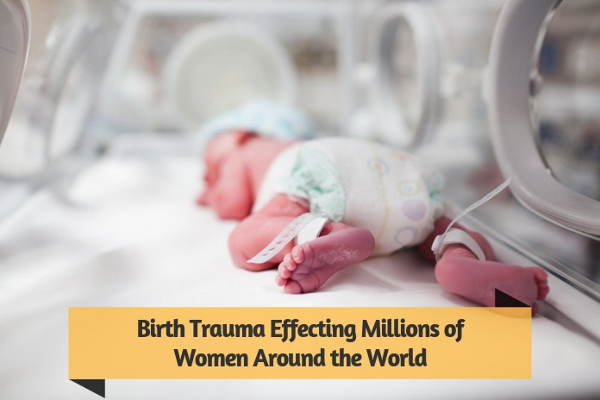Many women wait anxiously and excitedly for the moment when they will bring their child into the world. They share stories with friends and family, and spend countless hours dreaming of the moment they will meet their baby for the first time. Unfortunately for women all over the world, this dream quickly becomes a nightmare once they arrive at the hospital. This occurrence leaves millions of women healing from their wounds- both physically and mentally- and grieving for the experience they were expecting.


What Causes Birth Trauma?
There are many different reasons why women become the victims of birth trauma. In some instances, the trauma occurs innocently enough, such as in the case of necessary but intense medical intervention. In the birthing process, there are plenty of things that can go wrong, leaving both mother and baby compromised, and medical professionals have to do what it takes to ensure both will come through safe and healthy. While this can cause trauma by making the woman fearful of side effects and potentially having the experience repeated, it is not nearly as bad as what women experience when women feel forced and compromised during their delivery experience.
Unfortunately, not all instances of trauma occur out of necessity. Many women report feeling harassed, belittled, bullied and pressured into making decisions that they are uncomfortable with by medical staff. Causes of trauma include injury, fear of death, being made to feel like a poor parent, having your medical preferences questioned or denied, emotional and mental stress, and much more. These causes can affect the birthing mother, but there are also many cases of partners reporting feelings of trauma from witnessing a traumatic birthing situation. Even the baby can show signs of physical or mental trauma from the birth.
Women have reported being told that their babies were going to die if they did not consent to medical procedures, partners have said that they were coerced into agreeing to procedures they knew the mother didn’t want, and families have even stated that their physician threatened to call Child Protective Services when they tried to deny a procedure they felt uncomfortable with.
Who is Affected by Birth Trauma?
A study reported that 1 in 7 women suffer from PSTD symptoms as a result of their birthing experience. Additionally, there are hundreds of thousands of cases of partners, family members, and friends who have reported that they felt either moderately or severely traumatized from witnessing a birth. Even doctors and nurses have reported feeling the affects of trauma. While medical staff is trained to deal with intense medical situations, many nurses have stated that they have been shaken by the disrespect and neglect they have witnessed while taking care of laboring mothers.
What are the Effects of Birth Trauma?
Birth Trauma is defined as a set of symptoms occurring as the result of a traumatic birthing experience that last for at LEAST one month. These symptoms can be physical, emotional, or psychological in nature. Emotional and mental affects of birth trauma can include:
- Nightmares and flashbacks of the birthing experience which can cause intense feelings of fear and helplessness
- Feeling emotionally numb, withdrawing from loved ones and support systems and in some cases even causing an inability for a parent to bond with the new child
- Difficulty sleeping, inability to concentrate, panic and anxiety, difficulty relaxing, anger and bursts of rage
- Social anxiety
The physical effects can be more or less severe depending on the medical intervention that took place during delivery, but some common medical procedures that can lead to birth trauma include caesarian section (surgical removal of the baby for emergency purposes, performed with an epidural or under general anesthesia), episiotomy (a procedure conducted to expand the vaginal canal for birth), amniotomy (breaking a woman’s water to prepare for or induce labor), using medications to induce labor which can cause extremely painful contractions, and vacuum and forceps delivery methods which can be intrusive and painful, and even harm the baby. Some potential effects of physical birth trauma can include:
- Pain and injury to internal organs
- Infection, possibly leading to sepsis which is life threatening
- Hemorrhage and blood loss, or blood clots
- Difficulty conceiving or giving birth in the future
The effects of birth trauma can be extremely long lasting, often requiring therapeutic intervention or even anti-anxiety or anti-depressant medications to overcome. In fact, it is important to address the effects of birth trauma for women who are looking to conceive again, because physical and emotional stress caused by trauma can negatively affect pregnancy health.
How to Avoid a Traumatic Birth
There are many precautions that can be taken to avoid becoming a victim to a traumatic birth. The number one recommended way to avoid a negative birth experience is to be educated about labor and delivery. Being educated about the process of delivering a child can help women to understand what is happening to their body in order to keep a level head and make informed decisions even under stress and pressure. This also allows women to advocate better for themselves and their unborn child. Additionally, women are encouraged to research the hospital or birthing suite they intend to deliver at if they plan to have a hospital birth. Some facilities have an increased rate of caesarian sections compared to other hospitals, which can be a clear indication that a woman may be pressured into having a surgical birth at that facility.
Another common practice for expectant mothers is to seek the help of a doula or midwife to help them form a birth plan that they are comfortable with and help them stick to it. A doula or midwife will often be training in many different birth plans and can help women make decisions about the type of delivery they want, help to consider options that they may or may not be comfortable with- such as a medicated vs and unmedicated birth- and most importantly when it comes to avoiding birth trauma, they can be there to stick up for women who are tired, in pain, under stress and may not be capable of standing up for themselves.
Finally, it is important to remember that all patients in a medical facility are entitled to fair treatment and informed consent. Women can and should request a new physician or medical staff if at any point they feel uncomfortable or that they are being pressured to make medical decisions that they are not comfortable with. Women have the right to ask questions and receive thorough answers to help them make medical decisions for themselves and their child.

























